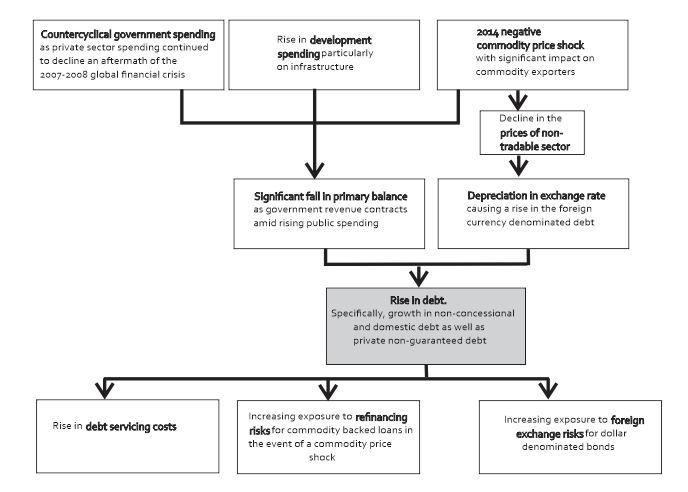Currently, Congo Republic’s debt stands at 114% of its GDP but the International Monetary Fund is helping to cut it down. Alone, about 1.6 trillion CFA francs ($2.7 billion) is owed to China according to a February 2018 report by the French Embassy in Congo, which cited the Finance Ministry.
Private creditors like Glencore and Trafigura are owed 1.2 trillion CFA francs, it said. Chinese entities account for about 34 percent of Congo’s external debt. But all that is about to change with this IMF intervention.

Here Is The Deal
- The bailout did not just happen. Congo Republic had been mounting intense pressure on the IMF for a bailout.
- But IMF had insisted that China would agree to restructure debt owed by the Republic of Congo before it grants the debt-laden central African nation a bailout.
- Congo’s negotiations for a bailout has been on for two years before this.
- In April 2019, Congo reached an agreement with China to restructure a portion of its Chinese debt
- Under the terms of this restructuring deal, repayment of 944 billion CFA francs will be extended to an additional 15 years.
- Congo, however, must pay off a third of that amount by the end of 2021 and China will not reduce the amount of principal owed, a process known as taking a haircut.
- According to the IMF, this is a substantial reduction in the amount of debt service that would have been required during the program period.
- What is hoped to achieve here is that the extension of the debt’s maturity will ease Congo’s debt service burden in following years?
- The International Monetary Fund’s (IMF) executive board, in exchange, has now approved a bailout worth nearly $449 million for the Congo Republic.
- But all that would not happen just like that. For Congo to continue to benefit from the bailout, IMF has demanded that Congo put in place processes to ensure the long-term sustainability of its debt as a precondition before going for a three-year extended credit facility programs, going forward.

Congo’s economy suffered from a sharp drop in crude prices in 2014, and debt levels had ballooned to 118% of GDP by 2017.
Now, This Move Is So Significant For Other African Countries Under Heavy Debt Burdens With China And Here Is Why

This bailout potentially set a precedent for other nations struggling under the weight of large debts to China.
It appears that what IMF has succeeded in doing is to alert other countries borrowing from China that China would never cut off any percent from any borrowed sum, but may instead, prolong the period of repayment.
Many observers see Congo as a test case for the IMF.
A number of African countries facing unsustainable debt resulting from commercial borrowing, a boom in Eurobond issues and years of Chinese lending on the continent are expected to turn to the IMF for help in the coming years.
In 2017, public debt as a percent of GDP in sub-Saharan Africa was 45.9 percent relative to the 117 percent external debt-to-GNI ratio of 1995.
This is even bound to grow more because sovereign debt financing is inevitable given that African countries budgetary resources are insufficient to finance their vast development agenda.
“The IMF is tacitly accepting that China will not take a haircut on debts to African governments,” said one banker, who has followed the negotiations.
The IMF is also advising Congo’s government to restructure high-interest debt it contracted with oil traders including Glencore (GLEN.L) and Trafigura despite a previous pledge to the Fund that it would not engage in oil-backed borrowing.
“I think they’ve learned their lesson as to the costs of these kinds of practices,” Alex Segura, IMF mission chief for Congo, told Reuters.
IMF Is Also Pitching Its Stakes And Leaving African Countries At Their Own Mercy

All that bailout would not just happen without a reciprocal deal. For instance, the IMF said in November that Congo’s government must take a series of steps before the lender agrees to a bailout, including reforms to improve governance and transparency, adjustments to the state budget. It’s also requested “explicit financing assurances,” including debt relief, from creditors before it considers a bailout.
With all these, African countries with heavy debt burdens may all be sitting on a time bomb.
Charles Rapulu Udoh

Charles Rapulu Udoh is a Lagos-based Lawyer with special focus on Business Law, Intellectual Property Rights, Entertainment and Technology Law. He is also an award-winning writer. Working for notable organizations so far has exposed him to some of industry best practices in business, finance strategies, law, dispute resolution, and data analytics both in Nigeria and across the world.
